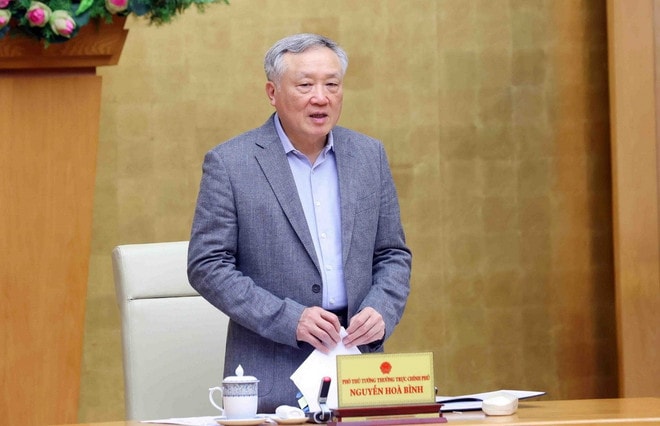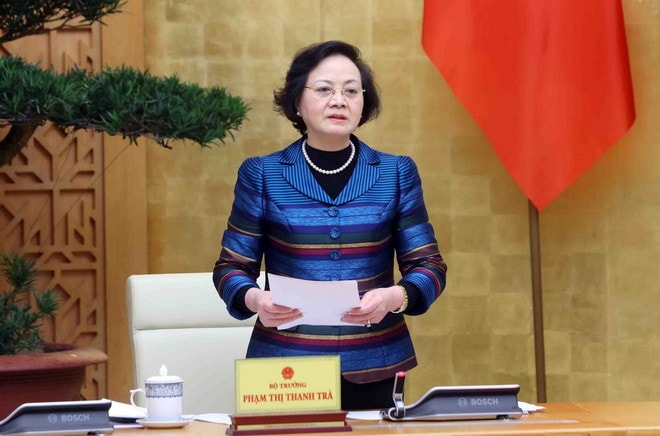About 1/3 of the district's tasks will be transferred to the province, 2/3 will be transferred to the commune level.
Deputy Prime Minister Nguyen Hoa Binh said that according to the Government's proposal, about 1/3 of the tasks currently undertaken by the district will be transferred to the province, and 2/3 will be transferred to the commune level - the grassroots level.

On the afternoon of March 13, the Steering Committee for the implementation of the arrangement and reorganization of administrative units at all levels and the construction of a two-level local government organization model held its first meeting.
Deputy Prime Minister Nguyen Hoa Binh, Head of the Steering Committee chaired the meeting.
Need to agree on the time to stop the district-level government model

At the meeting, Minister of Home Affairs Pham Thi Thanh Tra, Deputy Head of the Steering Committee, announced Decision No. 571/QD-TTg on the establishment of the Steering Committee to reorganize administrative units at all levels and build a two-level local government organization model.
Discussing the Steering Committee's work plan, Minister of Justice Nguyen Hai Ninh said that the Law on Organization of Local Government will be amended in the near future to regulate the organization of two-level local governments, clearly defining the tasks between provincial and sub-provincial governments; issues related to the transition of tasks, powers, and organization of the local government apparatus when rearranging and reorganizing into two levels.
The Ministry of Justice will discuss with the National Assembly agencies whether it is necessary to develop a resolution to handle some issues when reorganizing administrative units similar to Resolution No. 190/2025/QH15 of the National Assembly.
Sharing the opinion of Minister Nguyen Hai Ninh, Minister of Agriculture and Environment Do Duc Duy said that we are regulating according to the 3-level local government model, in which there are specialized fields where district-level governments have a lot of authority and handle many administrative procedures, for example in the land sector.
The plan does not state when the district government model will officially end, after the merger of commune level or when the provincial level is completed. If it ends on June 30, it is necessary to have a resolution of the National Assembly, in which the most urgent and fundamental issues related to people and businesses are addressed.
“Land, social security, education, health care… these issues are under the jurisdiction of the district level. In the Land Law, many contents depend on the district level, from district-level land use planning/planning, to the first issuance of certificates… If we resolve one law and amend many laws, we cannot make it in time for the National Assembly session this May,” Minister Do Duc Duy stated his opinion.
He proposed to issue a resolution of the National Assembly in May 2025 and amend the Law in October 2025.
"If this issue is not handled promptly, it will cause a huge bottleneck in both social management and socio-economic development. After the Central report is completed, it is also necessary to agree on a time to stop the district-level government model so that the Government can take the initiative in developing guiding documents and other following contents," the Minister proposed.
Ms. Nguyen Phuong Thuy, Vice Chairwoman of the National Assembly's Committee on Law and Justice, agreed that after the Central Executive Committee Conference, it is necessary to submit to the National Assembly Standing Committee a resolution on the arrangement of administrative units to serve as a basis for localities to develop projects and promptly implement the arrangement.
According to Ms. Nguyen Phuong Thuy, reducing the district-level government and decentralizing more power to the commune-level government, in addition to the requirement to increase the tasks and powers, the staff and civil servants, the requirement for resources is extremely important. If the State Budget Law is not amended to change the allocation norms for the government levels, the commune level will not have enough resources to carry out the assigned tasks. The State Budget Law is a priority that needs to be amended and supplemented immediately, otherwise it will be "stuck."
According to Ms. Thuy, the apparatus has recently been reorganized horizontally, with basically equal authority. Now that one level of government has been removed, there must be a way to handle the issue of redistributing authority while amending relevant legal documents.
“Through the recent reorganization, we found that there are contents that need to be regulated more clearly. For example, what documents need to be changed and what does not need to be changed, needs to be clearly affirmed. It should not be regulated in the direction that if people have a need, they can change it,” Ms. Thuy said.
Ms. Nguyen Phuong Thuy said that, one, people still go to change, which creates more burden for state agencies, two, some places still encourage people to change, even though it is not necessary to change, causing difficulties for both sides.
Important work, very complicated, very large volume
Emphasizing that this is a very important matter for the nation and people, a very big, very difficult, and very complicated matter, Minister of Home Affairs Pham Thi Thanh Tra said that the upcoming workload is very large. On March 14, the Politburo met to agree on the policy, after which the Government Party Committee will send the project to collect opinions from localities and send it to ministries and branches for comments. It is expected that around mid-April 2025, the Steering Committee will report to the Central Executive Committee.
Regarding the reorganization of commune-level administrative units, the Minister of Home Affairs said that there are currently 10,035 commune-level administrative units, which will be reorganized to a scale of only about 2,000, "almost a small district." This is under the authority of the National Assembly Standing Committee and can be done immediately after the Central Executive Committee Conference. After the amended Constitution; amendments and supplements to the Law on Organization of Local Government and related laws come into effect, the activities of district-level local governments will end. "When there is a full legal basis, which is the Constitution, the Law on Amendments and Supplements to the Law on Organization of Local Government, especially the Resolution, we will focus on arranging and merging provincial-level administrative units... Then we will deploy tasks related to the congress," the Minister of Home Affairs informed.
In his concluding remarks, Permanent Deputy Prime Minister Nguyen Hoa Binh welcomed the Ministry of Home Affairs to promptly establish the Steering Committee, develop plans, issue regulations, etc. Noting that this is a very important matter, related to the nation, the people, and the effective and efficient organization of the apparatus, there is a lot of work, very complicated, requiring completion with high quality but very urgent time, the Deputy Prime Minister requested ministries, branches and members of the Steering Committee to promote a sense of responsibility, fully participate in meetings, carefully study documents, and contribute to the Steering Committee to complete the assigned tasks. The Ministry of Home Affairs will absorb the opinions at the meeting to complete the plan.
Regarding the abolition of district-level administrative units, the Permanent Deputy Prime Minister said that according to the Government's proposal, about 1/3 of the tasks currently undertaken by the district will be transferred to the province, and 2/3 will be transferred to the commune level - the grassroots level. The Politburo will decide on the name of the commune and the roadmap; next week, the Politburo plans to seek opinions from party organizations, ministries, branches, and localities.
The Permanent Deputy Prime Minister also assigned specific tasks to a number of ministries and branches, and requested agencies, the Procuracy, and the Court to proactively make proposals related to procedural procedures and jurisdiction./.
